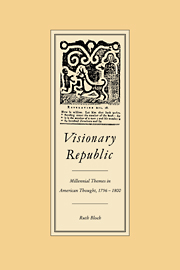Book contents
- Frontmatter
- Contents
- Acknowledgments
- Introduction
- PART I THE DEVELOPMENT OF A MILLENNIAL TRADITION IN COLONIAL AMERICA
- PART II THE RISE AND DECLINE OF MILLENNIALISM IN THE REVOLUTIONARY ERA
- PART III THE ESCHATOLOGICAL REVIVAL OF THE 1790'S
- 6 Exegesis
- 7 Francophilic millennialism and partisan Republican ideology
- 8 Biblical millennialism and radical Enlightened utopianism
- 9 Francophobic reaction and evangelical activism
- Notes
- Index
9 - Francophobic reaction and evangelical activism
Published online by Cambridge University Press: 29 October 2009
- Frontmatter
- Contents
- Acknowledgments
- Introduction
- PART I THE DEVELOPMENT OF A MILLENNIAL TRADITION IN COLONIAL AMERICA
- PART II THE RISE AND DECLINE OF MILLENNIALISM IN THE REVOLUTIONARY ERA
- PART III THE ESCHATOLOGICAL REVIVAL OF THE 1790'S
- 6 Exegesis
- 7 Francophilic millennialism and partisan Republican ideology
- 8 Biblical millennialism and radical Enlightened utopianism
- 9 Francophobic reaction and evangelical activism
- Notes
- Index
Summary
And the kingdom and dominion, and the greatness of the kingdom under the whole heaven, shall be given to the people of the saints of the Most High.
Daniel 7:27In America before 1798 it was rare for either biblical millennialists or secular Utopians to take a hostile view of the French Revolution. The few anti-Jacobin visionaries like Charles Crawford and James Stewart tended to be recent immigrants to the United States. Most American critics of France simply abstained from millennial or Utopian analysis of the French Revolution. For the vast majority of American utopians and millennialists, the revolution's joint attack on monarchy and papal superstition seemed sufficient to outweigh, even to justify, evidence of its violence and infidelity. A few radical Deists went so far as to applaud openly the French government's wholesale rejection of Christianity. For Protestant millennialists, of course, the French civil religion posed greater interpretative problems. But in the mid-1790's they too usually viewed the French as divine instruments crushing the papal Antichrist and thereby indirectly advancing the interests of the true faith.
THE INFIDEL ANTICHRIST AND THE PERILOUS LAST DAYS
In the second half of the decade, however, increasing numbers of American Protestants were no longer compelled by this logic. The threats posed by French Deism and atheism now seemed to counterbalance, indeed even to outweigh, French anti-Catholicism. Few remained sanguine about the possibilities of a Protestant France. However much most American millennialists still welcomed the collapse of the Papacy, those who published their views on the world tended to see infidelity as an equally pernicious force. The line dividing the legions of Satan and the legions of Christ was thus significantly redrawn.
- Type
- Chapter
- Information
- Visionary RepublicMillennial Themes in American Thought, 1756–1800, pp. 202 - 232Publisher: Cambridge University PressPrint publication year: 1985



